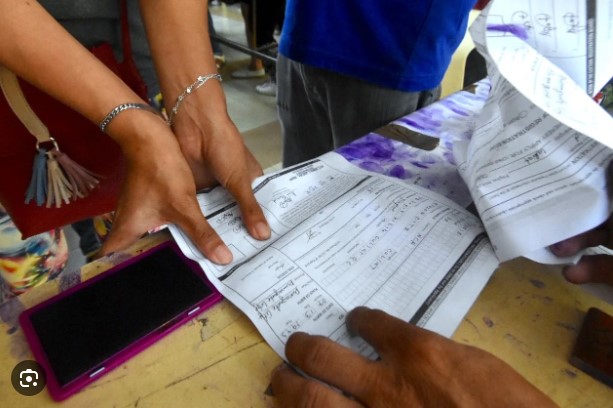Back in 2008, a young mother noticed her 14 year-old daughter watching the Presidential debates on television, holding a pen poised over her open notebook as though about to take notes.
“What’s up, honey?” she asked her daughter.
“I’m writing their points down so I can decide who to vote for,” the daughter replied with all seriousness.
“But honey, you’re too young to vote,” the mother said, smiling from ear to ear.
The little girl, her attention still glued to the TV, tapped her pen against her forehead and said, “not in here.”
I read this allegedly true (and I have no reason to believe otherwise) anecdote just before Barack Obama was elected as the first African-American President of the United States. Apart from being a charming story, it illustrated a crucial point about voter education: you can’t start too early.
The story also called to mind a personal experience I had, just a few short years earlier.
In 2004 – or thereabouts – as I was reaching out to various advocacy groups to promote voter education, I was told that an administrative order had previously been issued by either the Department of Education or by the Office of the President (no one was sure which), mandating voter education in schools. No one seemed to have a copy, however. I tried searching for that order, whatever it was, and came up empty-handed as well. When I brought this to the attention of a gathering of teachers, they all claimed to have some memory of it, but none could identify it either.
As if that weren’t discouraging enough, one of the participants stood up and proudly proclaimed that, although she definitely did see the Order, she had deliberately ignored it because, as she put it, government officials were corrupt and she didn’t want to be a party to their schemes, and that we shouldn’t be in a hurry to introduce kids to the “dirty world of politics” anyway.
It was the memory of this teacher, saying those things, that immediately came to mind when I read the story of the woke little girl watching the Presidential debates, four years later. If nothing else, the story of the pre-voter drove home two critical lessons: first, when it comes to voter education, you can’t start early enough; and second: there’s also a lot of work to be done waking the teachers themselves up, so that they can be good voter educators.
The Economist (the magazine) reports that in Nordic countries, very young children are exposed to the core principles of democracy, using age-appropriate methodologies. In Canada, as well, the practice is to start young. School kids are divided into groups and each group is allowed to decide amongst themselves which “candidate” animal they would “elect” as the group’s mascot.
As the kids get older, debates are introduced as a way of getting them used to the practice of verbalizing their opinions and – most importantly – to teach them to accept defeat, when they fail to convince their classmates to see things their way. At this point, none of these activities are overtly political, but they are real-world exercises in the fundamentals of participatory democracy. In this way, these kids grow up well-versed in the language, the practices, and norms of elections.
Contrary to the belief of some legislators and policy makers who stand in opposition to the idea, voter education in schools will not deal with politics per se. Rather, it aims only to develop in the youth, the proper mindset for navigating the world of real politics when they reach voting age. Research shows that kids who, early on, are given the opportunity to discuss current events are more likely to be politically engaged as they come of age. Without this groundwork, on the other hand, kids are likely to be ill-equipped to become woke voters, to say nothing of being elected officials themselves.
Voter education must start in school, and fairly early as well. This much is clear. What is not so clear is whether our teachers are adequately trained to be good voter educators.
The worst pitfall for teachers, obviously, is cynicism. If the teacher I spoke with in 2004 (or thereabouts) was any indication (and the cheers that greeted her rant convince me that she was) of the prevailing sentiment, then there is a very real danger of students learning to be dismissive of government and politics as being “dirty,” ironically contributing to the apathy and disinterest voter education is supposed to address.
It goes without saying that this kind of indoctrination – and its government cheerleading mirror-image, propagandizing – is anathema to voter education and should be guarded against. Properly done, voter education will emphasize the development of skills essential to democracy – the readiness to intelligently debate controversial issues, the ability to disagree respectfully and to be tolerant of dissent, and sensitivity to the ‘other.’
Nor should voter education be considered a separate subject. Practically speaking, there’s only so much that needs to be memorized about the electoral system anyway. Instead, voter education principles and activities must be seeded all across the curriculum. Understandably, this puts a lot of pressure on the teacher to contextualize discussions fairly and in a way that will make the students more aware and appreciative of the fundamentals of democracy.
The conditions necessary for all of these things to happen may not have been present in 2004. Hopefully, attitudes have changed since then. If not in terms of how government officials are viewed, then at least in the understanding of what voter education actually means and what it entails: not the indoctrination of the youth in the politics of the moment, but the preparation of young minds to look at politics with comprehension and with an appreciation of their critical role in it as voters; just like that TV-watching pre-voter who understood that she wasn’t too young to vote, even if only in her head.

